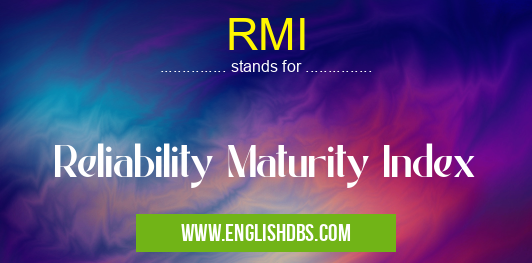What does RMI mean in UNCLASSIFIED
Reliability Maturity Index (RMI) is a quantifiable measure of an organization's software development and quality assurance processes. It assesses the maturity of an organization's software development practices, helping to identify areas for improvement and enhance the reliability of software products.

RMI meaning in Unclassified in Miscellaneous
RMI mostly used in an acronym Unclassified in Category Miscellaneous that means Reliability Maturity Index
Shorthand: RMI,
Full Form: Reliability Maturity Index
For more information of "Reliability Maturity Index", see the section below.
Key Elements of RMI
- Process Definition: The extent to which software development processes are clearly defined, documented, and followed.
- Process Implementation: The effectiveness of implementing defined processes and adhering to them.
- Process Measurement: The availability and use of metrics to monitor and evaluate process performance.
- Quality Assurance: The effectiveness of testing and quality control measures in ensuring the quality of software products.
- Process Improvement: The organization's commitment to continuously improving software development processes.
Benefits of RMI
- Improved software quality and reliability
- Reduced software defects and vulnerabilities
- Enhanced customer satisfaction and reduced support costs
- Efficient software development and reduced project overruns
- Demonstrated commitment to quality and process maturity
Essential Questions and Answers on Reliability Maturity Index in "MISCELLANEOUS»UNFILED"
What is the Reliability Maturity Index (RMI)?
The Reliability Maturity Index (RMI) is a measure of an organization's ability to develop and maintain reliable software systems. It is a five-level scale, with Level 1 being the lowest level of maturity and Level 5 being the highest.
What are the benefits of using the Reliability Maturity Index (RMI)?
The benefits of using the Reliability Maturity Index (RMI) include:
- Improved software quality and reliability
- Reduced software development costs
- Increased customer satisfaction
- Improved risk management
How can I improve my organization's Reliability Maturity Index (RMI)?
You can improve your organization's Reliability Maturity Index (RMI) by:
- Implementing a software quality assurance program
- Establishing a software development process
- Training your staff on software quality and reliability
- Using tools and techniques to measure and improve software quality
Final Words: RMI provides a valuable framework for organizations to assess and improve their software development practices. By identifying areas for improvement and implementing effective processes, organizations can enhance the reliability of their software products, increase customer satisfaction, and gain a competitive advantage in the market.
RMI also stands for: |
|
| All stands for RMI |
